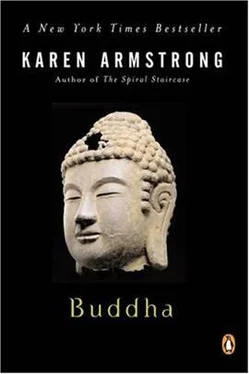Gotama would not, therefore, have agreed with our current cult of “family values.” Nor would some of his contemporaries or near-contemporaries in other parts of the world, such as Confucius (551-479) and Socrates (469-399), who were certainly not family-minded men, but who would, like Gotama himself, become key figures in the spiritual and philosophical development of humanity during this period. Why this rejectionism? The later Buddhist scriptures would evolve elaborate mythological accounts of Gotama’s renunciation of domesticity and his “Going Forth” into homelessness, and we shall consider these later in this chapter. But the earlier texts of the Pali Canon give a starker version of the young man’s decision. When he looked at human life, Gotama could see only a grim cycle of suffering, which began with the trauma of birth and proceeded inexorably to “aging, illness, death, sorrow and corruption.” He himself was no exception to this universal rule. At present he was young, healthy and handsome, but whenever he reflected on the suffering that lay ahead, all the joy and confidence of youth drained out of him. His luxurious lifestyle seemed meaningless and trivial. He could not afford to feel “revolted” when he saw a decrepit old man or somebody who was disfigured by a loathsome illness. The same fate-or something even worse-would befall him and everybody he loved. His parents, his wife, his baby son and his friends were equally frail and vulnerable. When he clung to them and yearned tenderly toward them, he was investing emotion in what could only bring him pain. His wife would lose her beauty, and little Rahula could die tomorrow. To seek happiness in mortal, transitory things was not only irrational: the suffering in store for his loved ones as well as for himself cast a dark shadow over the present and took away all his joy in these relationships.
But why did Gotama see the world in such bleak terms? Mortality is a fact of life that is hard to bear. Human beings are the only animals who have to live with the knowledge that they will die one day, and they have always found this vision of extinction difficult to contemplate. But most of us manage to find some solace in the happiness and affection that is also part of the human experience. Some people simply bury their heads in the sand and refuse to think about the sorrow of the world, but this is an unwise course, because, if we are entirely unprepared, the tragedy of life can be devastating. From the very earliest times, men and women devised religions to help them cultivate a sense that our existence has some ultimate meaning and value, despite the dispiriting evidence to the contrary. But sometimes the myths and practices of faith seem incredible. People then turn to other methods of transcending the sufferings and frustrations of daily life: to art, music, sex, drugs, sport or philosophy. We are beings who fall very easily into despair, and we have to work very hard to create within ourselves a conviction that life is good, even though all around us we see pain, cruelty, sickness and injustice. When he decided to leave home, Gotama, one might think, appeared to have lost this ability to live with the unpalatable facts of life and to have fallen prey to a profound depression.
Yet that was not the case. Gotama had indeed become disenchanted with domestic life in an ordinary Indian household, but he had not lost hope in life itself. Far from it. He was convinced that there was a solution to the puzzle of existence, and that he could find it. Gotama subscribed to what has been called the “perennial philosophy,” because it was common to all peoples in all cultures in the pre-modern world. Earthly life was obviously fragile and overshadowed by death, but it did not constitute the whole of reality. Everything in the mundane world had, it was thought, its more powerful, positive replica in the divine realm. All that we experienced here below was modeled on an archetype in the celestial sphere; the world of the gods was the original pattern of which human realities were only a pale shadow. This perception informed the mythology, ritual and social organizations of most of the cultures of antiquity and continues to influence more traditional societies in our own day. It is a perspective that is difficult for us to appreciate in the modern world, because it cannot be proved empirically and lacks the rational underpinning which we regard as essential to truth. But the myth does express our inchoate sense that life is incomplete and that this cannot be all there is; there must be something better, fuller and more satisfying elsewhere. After an intense and eagerly awaited occasion, we often feel that we have missed something that remains just outside our grasp. Gotama shared this conviction, but with an important difference. He did not believe that this “something else” was confined to the divine world of the gods; he was convinced that he could make it a demonstrable reality in this mortal world of suffering, grief and pain.
Thus, he reasoned to himself, if there was “birth, aging, illness, death, sorrow and corruption” in our lives, these sufferings states must have their positive counterparts; there must be another mode of existence, therefore, and it was up to him to find it. “Suppose,” he said, “I start to look for the un born, the un aging, un ailing, death less , sorrow less , in corrupt and supreme freedom from this bondage?” He called this wholly satisfactory state Nibbana (“blowing out”). Gotama was convinced that it was possible to “extinguish” the passions, attachments and delusions that cause human beings so much pain, rather as we snuff out a flame. To attain Nibbana would be similar to the “cooling” we experience after we recover from a fever: in Gotama’s time, the related adjective nibbuta was a term in daily use to describe a convalescent. So Gotama was leaving home to find a cure for the sickness that plagues humanity and which fills men and women with unhappiness. This universal suffering which makes life so frustrating and miserable was not something that we were doomed to bear forever. If our experience of life was currently awry, then, according to the law of archetypes, there must be another form of existence that was not contingent, flawed and transient. “There is something that has not come to birth in the usual way, which has neither been created and which remains undamaged,” Gotama would insist in later life. “If it did not exist, it would be impossible to find a way out.”
A modern person may smile at the naivete of this optimism, and find the myth of eternal archetypes wholly incredible. But Gotama would claim that he did find a way out and that Nibbana did, therefore, exist. Unlike many religious people, however, he did not regard this panacea as supernatural. He did not rely on divine aid from another world, but was convinced that Nibbana was a state that was entirely natural to human beings and could be experienced by any genuine seeker. Gotama believed that he could find the freedom he sought right in the midst of this imperfect world. Instead of waiting for a message from the gods, he would search within himself for the answer, explore the furthest reaches of his mind, and exploit all his physical resources. He would teach his disciples to do the same, and insisted that nobody must take his teaching on hearsay. They must validate his solutions empirically, in their own experience, and find for themselves that his method really worked. They could expect no help from the gods. Gotama believed that gods existed, but was not much interested in them. Here again, he was a man of his time and culture. The people of India had worshipped gods in the past: Indra, the god of war; Varuna, the guardian of the divine order; Agni, the fire god. But by the sixth century, these deities had begun to recede from the religious consciousness of the most thoughtful people. They were not exactly regarded as worthless, but they had become unsatisfactory as objects of worship. Increasingly, people were aware that the gods could not provide them with real and substantial help. The sacrifices performed in their honor did not in fact alleviate human misery. More and more men and women decided that they must rely entirely on themselves. They believed that the cosmos was ruled by impersonal laws to which even the gods were subject. Gods could not show Gotama the way to Nibbana; he would have to depend upon his own efforts.
Читать дальше












